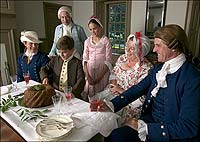Page content
An Evolving Society

Changing social relationships in the family caused changes in home design, providing for more privacy in bedrooms but more entertainment in common rooms, including dining and dancing. The new socially-driven demands, such as tea parties, also became more common, as household servants enabled whites to devote more time to social activities.
There were more white men living in the capital city of Williamsburg, which may explain why younger, socially adept white women found partners there of a higher social status. Successful artisan families could see their accomplished daughters marry into at least the lower gentry. In Williamsburg, it was somewhat easier to train daughters in music, dance, and deportment because of the availability of instructors in social skills. Williamsburg illustrated the fairly new mixing of status groups through marriage.
The more affectionate child-centered family that was popular by the end of the 18th century found a ready acceptance among the nation’s more republican authorities. The lessening of parental or patriarchal authority was the same as the rejection of the authority of the English monarch. The old ideals of class and place gave way as the middle class became more confident in its own values, more self-assured, and less willing to take orders.
War and the New Nation Force Further Change
The Revolutionary War sped change through society whether society was ready or not. Husbands left for war; wives found themselves temporary, sometimes permanent, heads of household. Wives’ duties expanded to include those things husbands used to do. Children had to adapt to just as many changes, and one of those was increased educational opportunity for girls.
Some families in the new nation lost more than they gained. American Indians were deprived of land, their traditional culture was attacked, and their population reduced. They were repeatedly uprooted and often forced to create a different family life. Slave families did no better, certainly, and perhaps fared worse. After the Revolutionary War, the opening of frontier land to the west and cotton land to the south meant many slave families were separated as they were forced to work in different areas of the growing country. The separation was often final.
Content excerpted from the Colonial Williamsburg Foundation’s publication “Becoming Americans”.
